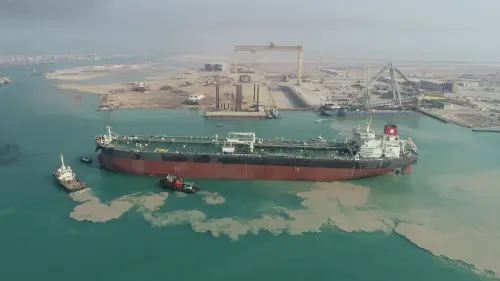A U.S. plan to impose tariffs on countries purchasing sanctioned Venezuelan oil represents an unprecedented and potentially powerful economic measure against a geopolitical opponent, which analysts suggest may be adaptable to other nations like Russia and Iran.
For years, the U.S. has maintained sanctions on Venezuela, Russia, and Iran to undermine their energy revenues, typically enforcing these sanctions through designations that target individuals or companies violating them. In a significant departure from this approach, President Trump recently authorized 25% tariffs on imports from any country buying Venezuelan crude oil and liquid fuels under the 1977 International Emergency Economic Powers Act.
Analysts note several advantages of using tariffs instead of targeted sanctions as a penalty for violations. Tariffs inflict economic damage across a nation's entire economy and are easier to implement than specific designations. Glenn Schwartz, director of energy policy at Rapidan Energy, remarked that employing IEEPA for broad tariffs represents a powerful addition to Trump's trade and foreign policy arsenal. Fernando Ferreira, director of geopolitical risk at Rapidan, predicted that if the tariffs withstand legal challenges, they could be an appealing option for the Trump administration to exert pressure on adversaries alongside traditional sanctions.
Enforcement may be simpler than with conventional sanctions, as it requires monitoring country-level dynamics rather than individual transactions. However, challenges remain, as exporters facing U.S. sanctions have extensive experience in concealing shipments, often using intermediaries and tactics such as switching off vessel transponders.
Both Venezuela and China criticized the U.S. announcement, claiming it violates international trade rules and constitutes an abuse of unilateral sanctions. Venezuela's government asserted that the U.S. is violating provisions that prohibit discrimination among trading partners, while China's foreign ministry spokesperson condemned the interference in internal affairs.
Trade dynamics indicate that after Trump's announcement, China, which has been buying approximately 500,000 barrels per day of Venezuelan crude—constituting about 55% of its exports—may continue its purchases, often rebranding the oil as Malaysian after transshipment.
China is also the largest buyer of Iranian crude oil, a situation Trump aims to reduce to zero as part of his maximum pressure campaign to prevent Tehran from developing nuclear weapons. The threat of additional tariffs on Iranian oil buyers could again put China in a difficult position, which may not align with U.S. interests. Sara Vakhshouri, president of SVB Energy International, observed that previous sanctions under Trump resulted in a significant reduction of Iran’s oil exports, largely due to Iran's involvement in broader tariff negotiations with China.
In a potential second term, the circumstances may change, as most of Iran's oil currently goes to China. Implementing further tariffs on China could contribute to inflation in the U.S. However, if Iran becomes part of U.S.-China tariff negotiations, secondary tariffs could effectively pressure Tehran and strengthen the U.S. sanctions enforcement.
Moreover, the U.S. could apply a similar strategy towards Russia, especially if a ceasefire deal concerning Ukraine remains elusive. Ferreira noted that Trump has threatened to escalate sanctions and tariffs on Russia to compel Moscow to agree to a ceasefire. While initial U.S. imports from Russia might be limited, there is potential for secondary tariffs to deter importers of Russian energy.
